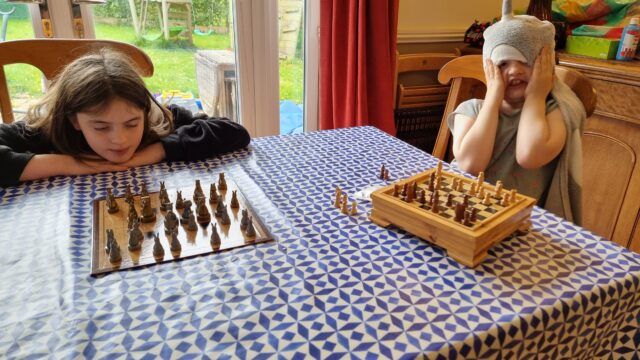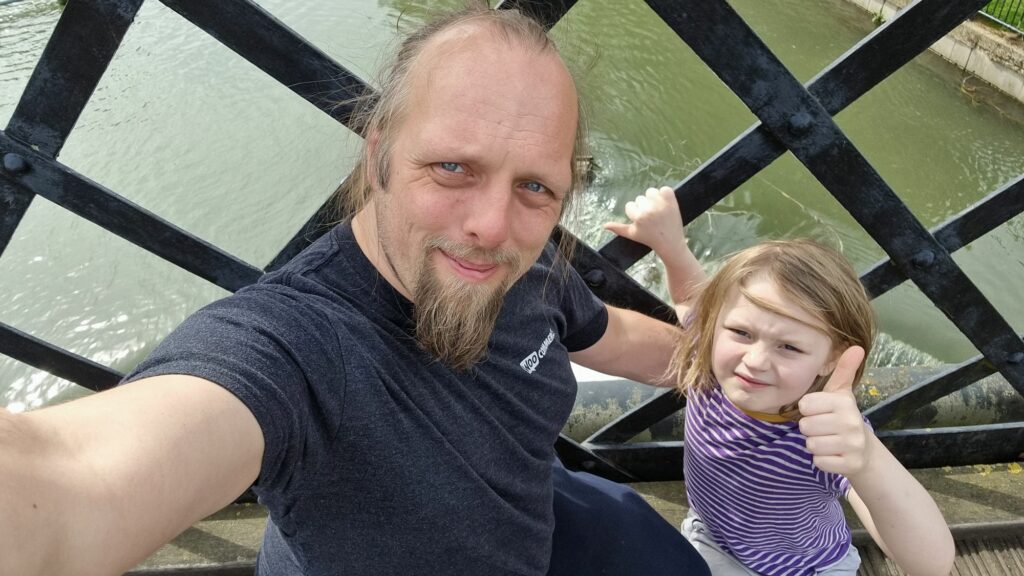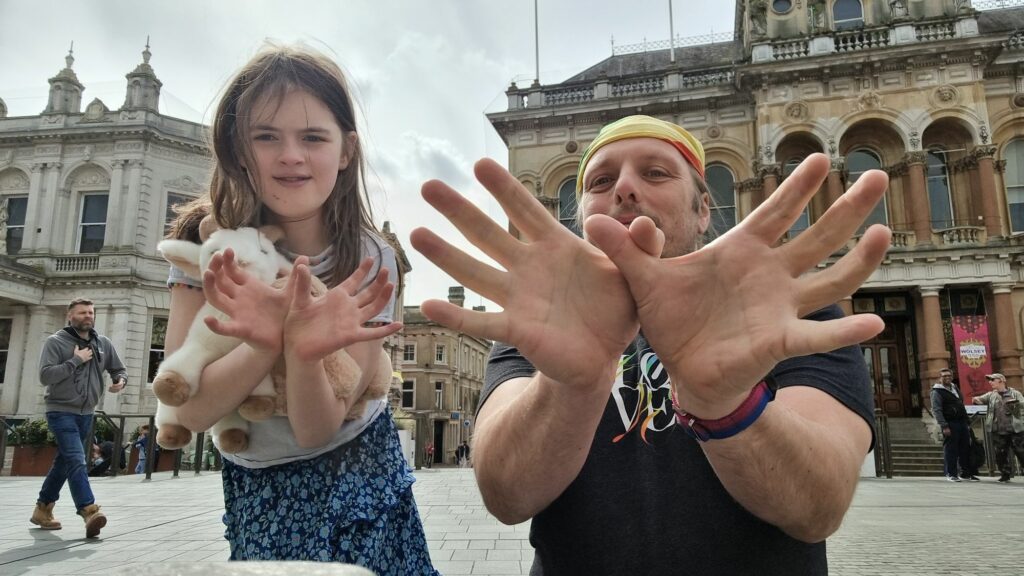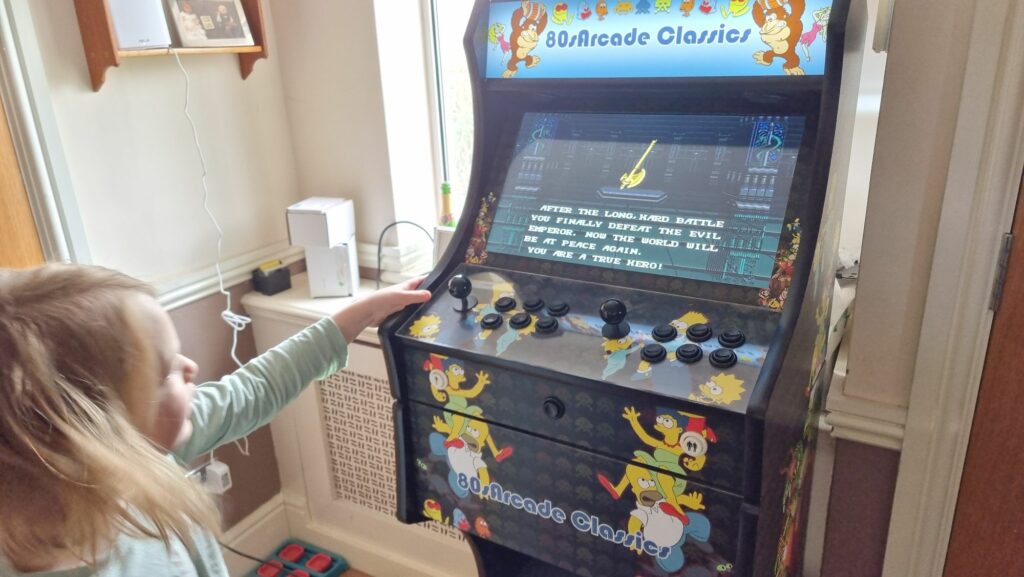Playing simultaneous games against both children might have been less challenging if they hadn’t both kept trying to start fights with one another at the same time! 😂
Tag: children
Note #24625
This morning’s actual breakfast order from the 7-year-old: “A sesame seed bagel with honey, unless there aren’t any sesame seed bagels, in which case a plain bagel with honey on one half and jam on the other half, unless there aren’t any plain bagels, in which case a cinnamon and raisin bagel with JimJams on one half and Biscoff on the other half.”
Some day, this boy will make a great LISP programmer. 😂
Note #24382
I’m not sure I’ve ever seen a parent look as awkward as the one whose kid, in a combined toilets/changing room, just pointed at me, saying: “Daddy, look! Look! That man’s using his willy to pee-pee in the standing-up toilet!” 🤣
Science Weekend
This weekend was full of science.
Research

This started on Saturday with a trip to the Harwell Campus, whose first open day in eight years provided a rare opportunity for us to get up close with cutting edge science (plus some very kid-friendly and accessible displays) as well as visit the synchrotron at Diamond Light Source.
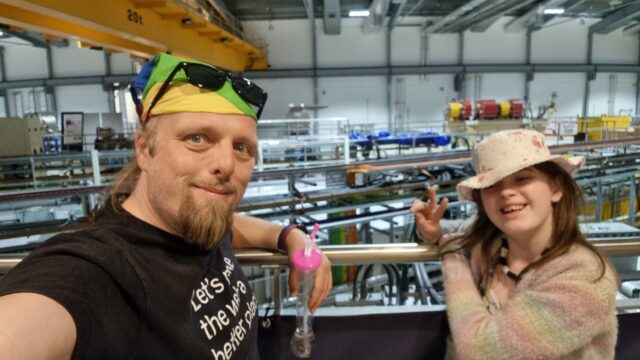
The whole thing’s highly-recommended if you’re able to get to one of their open days in the future, give it a look. I was particularly pleased to see how enthused about science it made the kids, and what clever questions they asked.
For example: the 7-year-old spent a long time cracking a variety of ciphers in the computing tent (and even spotted a flaw in one of the challenge questions that the exhibitors then had to hand-correct on all their handouts!); the 10-year-old enjoyed quizzing a researcher who’d been using x-ray crystallography of proteins.
Medicine
And then on Sunday I finally got a long-overdue visit to my nearest spirometry specialist for a suite of experiments to try to work out what exactly is wrong with my lungs, which continue to be a minor medical mystery.
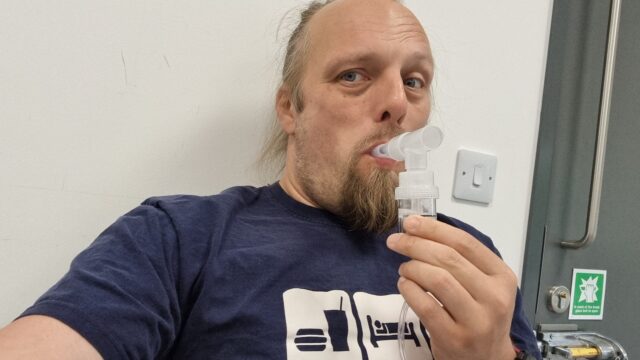
It was… surprisingly knackering. Though perhaps that’s mostly because once I was full of drugs I felt briefly superpowered and went running around the grounds of the wonderfully-named Brill Hill Windmill with the dog until was panting in pretty much the way that I might normally have been, absent an unusually-high dose of medication.
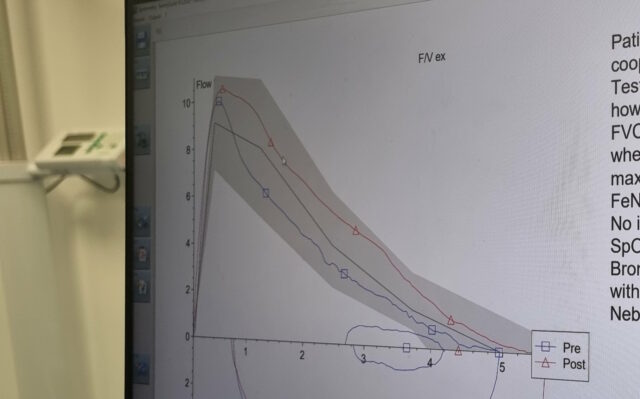
For amusement purposes alone, I’d be more-likely to recommend the first day’s science activities than the second, but I can’t deny that it’s cool to collect a load of data about your own body and how it works in a monitorable, replicable way. And maybe, just maybe, start to get to the bottom of why my breathing’s getting so much worse these last few years!
Woke Kids
The other weekend, I joined in with the parade at Witney Pride, accompanied by our 10-year-old who’d expressed an interest in coming too.
It was her first Pride but she clearly got the idea, turning up with a wonderful hand-coloured poster she’d made which, in rainbow colours, encouraged the reader to “be kind”.

You know what: our eldest is so woke it makes me embarrassed on behalf of my past self at her age. Or even at twice her age, when I still didn’t have the level of social and societal awareness and care about queer issues that she does already.
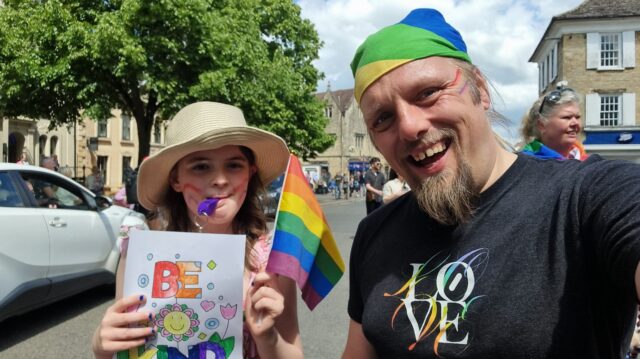
When we got to the parade’s destination, the kid found a stall selling a variety of badges, and selected for herself a “she/her/hers” pronoun pin.
“It’s not like anybody’s likely to look at me and assume that my pronouns are anything other than that,” she explained, “But I want it to be normal to talk about, and I want to show solidarity for genderqueer people.”
That’s a level of allyship that it took me until I was much, much older to attain. So proud!
Water Science #2
Back in 2019, the kids – so much younger back then! – and I helped undertake some crowdsourced citizen science for the Thames WaterBlitz. This year, we’re helping out again.
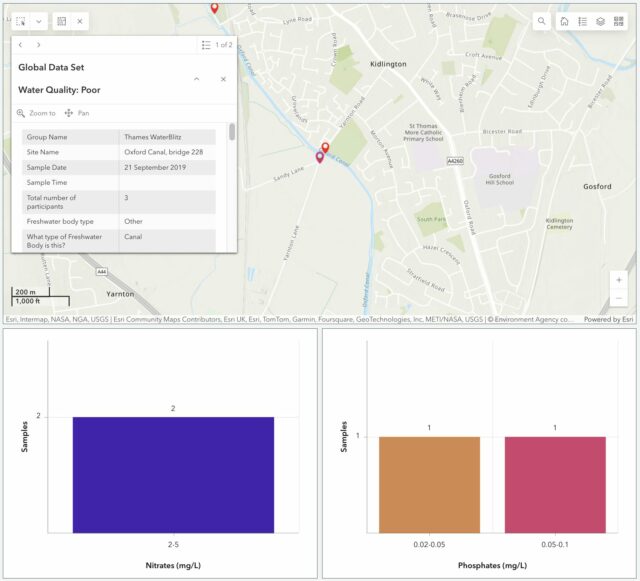
We’ve moved house since then, but we’re still within the Thames basin and can provide value by taking part in this weekend’s sampling activity. The data that gets collected on nitrate and phosphate levels in local water sources – among other observations – gets fed into an open dataset for the benefit of scientists and laypeople.
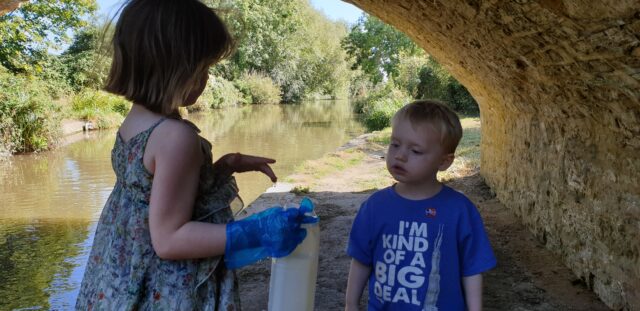
It’d have been tempting to be exceptionally lazy and measure the intermittent water course that runs through our garden! It’s an old, partially-culverted drainage ditch1, but it’s already reached the “dry” part of its year and taking a sample wouldn’t be possible right now.
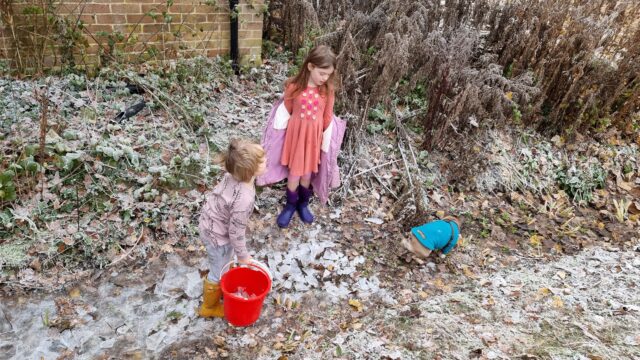
But more-importantly: the focus of this season’s study is the River Evenlode, and we’re not in its drainage basin! So we packed up a picnic and took an outing to the North Leigh Roman Villa, which I first visited last year when I was supposed to be on the Isle of Man with Ruth.
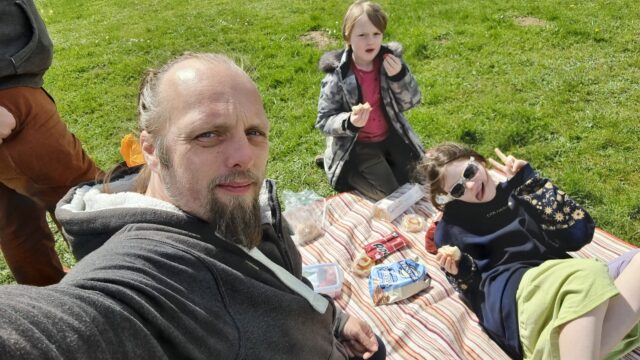
Our lunch consumed, we set off for the riverbank, and discovered that the field between us and the river was more than a little waterlogged. One of the two children had been savvy enough to put her wellies on when we suggested, but the other (who claims his wellies have holes in, or don’t fit, or some other moderately-implausible excuse for not wearing them) was in trainers and Ruth and I needed to do a careful balancing act, holding his hands, to get him across some of the tougher and boggier bits.
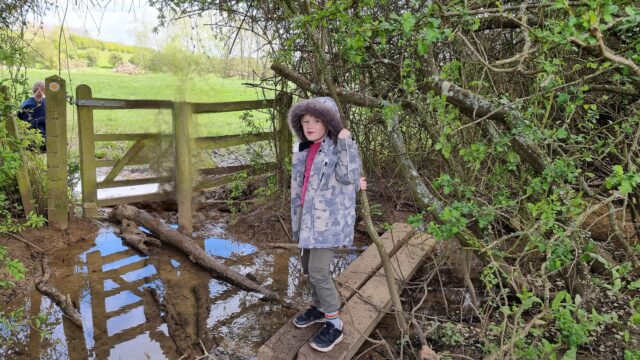
Eventually we reached the river, near where the Cotswold Line crosses it for the fifth time on its way out of Oxford. There, almost-underneath the viaduct, we sent the wellie-wearing eldest child into the river to draw us out a sample of water for testing.
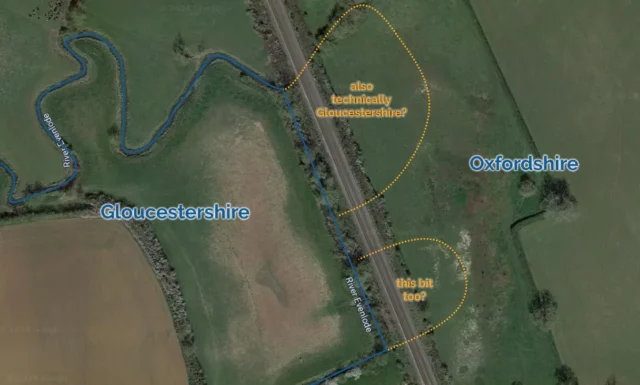
Looking into our bucket, we were pleased to discover that it was, relatively-speaking, teeming with life: small insects and a little fish-like thing wriggled around in our water sample2. This, along with the moorhen we disturbed3 as we tramped into the reeds, suggested that the river is at least in some level of good-health at this point in its course.

We were interested to observe that while the phosphate levels in the river were very high, the nitrate levels are much lower than they were recorded near this spot in a previous year. Previous years’ studies of the Evenlode have mostly taken place later in the year – around July – so we wondered if phosphate-containing agricultural runoff is a bigger problem later in the Spring. Hopefully our data will help researchers answer exactly that kind of question.
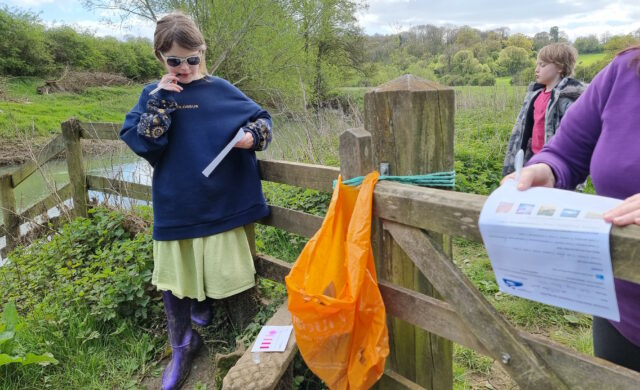
Regardless of the value of the data we collected, it was a delightful excuse for a walk, a picnic, and to learn a little about the health of a local river. On the way back to the car, I showed the kids how to identify wild garlic, which is fully in bloom in the woods nearby, and they spent the rest of the journey back chomping down on wild garlic leaves.

The car now smells of wild garlic. So I guess we get a smelly souvenir from this trip, too4!
Footnotes
1 Our garden ditch, long with a network of similar channels around our village, feeds into Limb Brook. After a meandering journey around the farms to the East this eventually merges with Chill Brook to become Wharf Stream. Wharf Stream passes through a delightful nature reserve before feeding into the Thames near Swinford Toll Bridge.
2 Needless to say, we were careful not to include these little animals in our chemical experiments but let them wait in the bucket for a few minutes and then be returned to their homes.
3 We didn’t catch the moorhen in a bucket, though, just to be clear.
4 Not counting the smelly souvenir that was our muddy boots after splodging our way through a waterlogged field, twice
Dan Q found GC2W6AF Babel Fish
This checkin to GC2W6AF Babel Fish reflects a geocaching.com log entry. See more of Dan's cache logs.
The younger child and I had an initially fruitless search in, under and around the nearby bridge before we had the sense to insert our babel fishes, after which the hint item became clear to us. A short search later the cache was in hand. SL, TNLN, TFTC!
Dan Q found GC8TNPE Incy Wincy
This checkin to GC8TNPE Incy Wincy reflects a geocaching.com log entry. See more of Dan's cache logs.
The elder child and I are staying nearby and couldn’t resist coming to a nearby cache with so many FPs. The name gave us a bit of a clue what we would be looking for but nothing could have prepared us for for this imaginative and unusual container! FP awarded. Attached is very non-spoiler photo of us with our very own Incy Wincies. Greetings from Oxfordshire!
Golden Axed
Hot on the heels of my victory over Wonder Boy 35 years after I first played it, I can now finally claim to have beaten Golden Axe, 25 years after I first played it.
Couldn’t have done it without my magic-wielding 7-year-old co-op buddy.
Shiftless Progressive Enhancement
Progressive enhancement is a great philosophy for Web application development. Deliver all the essential basic functionality using the simplest standards available; use advanced technologies to add bonus value and convenience features for users whose platform supports them. Win.
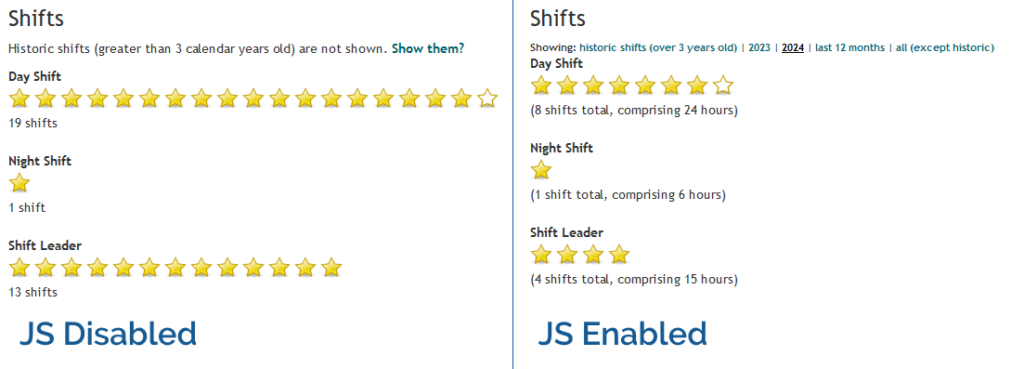
In Three Rings, for example, volunteers can see a “starchart” of the volunteering shifts they’ve done recently, at-a-glance, on their profile page1. In the most basic case, this is usable in its HTML-only form: even with no JavaScript, no CSS, no images even, it still functions. But if JavaScript is enabled, the volunteer can dynamically “filter” the year(s) of volunteering they’re viewing. Basic progressive enhancement.
If a feature requires JavaScript, my usual approach is to use JavaScript to add the relevant user interface to the page in the first place. Those starchart filters in Three Rings don’t appear at all if JavaScript is disabled. A downside to this approach is that the JavaScript necessarily modifies the DOM on page load, which introduces a delay to the page being interactive as well as potentially resulting in layout shift.
That’s not always the best approach. I was reminded of this today by the website of 7-year-old Shiro (produced with, one assumes, at least a little help from Saneef H. Ansari). Take a look at this progressively-enhanced theme switcher:
The HTML that’s delivered over-the-wire provides a disabled <select> element, which gains the CSS directive cursor: not-allowed;, to make it clear to the used that this dropdown doesn’t do anything. The whole thing’s wrapped
in a custom element.
When that custom element is defined by the JavaScript, it enhances the dropdown with an event listener that implements the theme changes, then enables the disabled
<select>.
<color-schemer> <form> <label> Theme <select disabled> <option value="">System</option> <option value="dark">Dark</option> <option value="light" selected>Light</option> </select> </label> </form> </color-schemer>
<label>
probably should use a for="..." rather than wrapping the <select>, but otherwise this code is absolutely gorgeous.
It’s probably no inconvenience to the minority of JS-less users to see a theme switcher than, when they go to use it, turns out to be disabled. But it saves time for virtually everybody not to have to wait for JavaScript to manipulate the DOM, or else to risk shifting the layout by revealing a previously-hidden element.
Altogether, this is a really clever approach, and I was pleased today to be reminded – by a 7-year-old! – of the elegance of this approach. Nice one Shiro (and Saneef!).
Footnotes
1 Assuming that administrators at the organisation where they volunteer enable this feature for them, of course: Three Rings‘ permission model is robust and highly-customisable. Okay, that’s enough sales pitch.
[Bloganuary] Landslide
This post is part of my attempt at Bloganuary 2024. Today’s prompt is:
What do you enjoy doing most in your leisure time?
Boo to this prompt! This Bloganuary already asked me how I like to play and about five things I do for fun; now it wants me to choose the thing I “enjoy most” from, presumably, that same set.
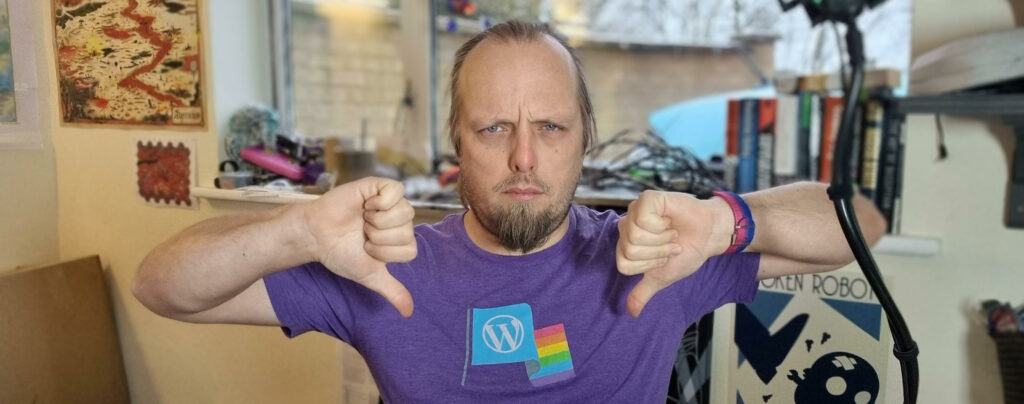
So I’m going to ignore this prompt.1 Instead, let’s go look up last year’s prompt from the same day:2
What is a song or poem that speaks to you and why?
Much better.
Landslide, by Fleetwood Mac.
At 5½ years older than me, the song’s been in my life effectively forever. But its themes of love and loss, overcoming naivety, growing up and moving on… have grown in significance to and with me as I’ve grown older. And to hear Stevie Nicks speak about it, it feels like it has for her as well, which just doubles the feeling it creates of timeless relevance.
In concert, Nicks would often dedicate the song to her father, which lead to all manner of speculation about the lyrics being about the importance of family. And there’s definitely an undertone of that in there: when in 2015 she confirmed that it was about a challenging moment of decision in her youth in which she was torn between continuing to try to “make it” as a musical act with her then-partner Lindsey Buckingham or return to education. Her father was apparently supportive of either option but favoured the latter.
Ultimately she chose the former and it worked out well for her career… although of course the pair’s romantic relationship eventually collapsed. And so the song’s lyrics, originally about indecision, grow into a new interpretation: one of sliding doors moments, of “what ifs”. In some parallel universe Stevie Nicks dropped out of Buckingham Nicks before Keith Olsen introduced Lindsey Buckingham to Mick Fleetwood, and we’d probably never have heard Landslide.3
Stevie still sings Landslide in concert, and now it feels like it’s entered its third life and lends itself a whole new interpretation. Those lyrics about turning around and looking back, which were originally about reconsidering the choices you made in your youth and the path you’d set yourself on, take on a whole new dimension when sung by somebody as they grow through their 60s and into their 70s!
In particular, coming to the song as a parent4 is a whole other thing. Its thoughts on innocence and growing-up, and watching your children do so, reminds me of my perpetual struggle with comparing myself to the best parent I know. An intergenerational effort to be my best me; to look forwards with courage and backwards with compassion for myself.
All of which is pretty awesome for a song that under other circumstances might be just a catchy twist on a classic country rock chord progression with some good singing. Sliding doors, eh?
Footnotes
1 It’s my damn blog; I can do what I want.
2 This is my first year doing Bloganuary, so I didn’t get to answer this prompt last time around.
3 Nor, for that matter, any of the other excellent songs that came out of Nicks’ and Buckingham’s strained relationship, such as Silver Springs, Second Hand News and, perhaps most-famously, Go Your Own Way. I guess sometimes you need the sad times to make the best art.
4 Nicks, of course, famously isn’t a parent, but I refer you to a 2001 interview in which she said “No children, no husband. My particular mission maybe wasn’t to be a mom and a wife. Maybe my particular mission was to write songs to make moms and wives feel better.”.
[Bloganuary] Attachment
This post is part of my attempt at Bloganuary 2024. Today’s prompt is:
Describe an item you were incredibly attached to as a youth. What became of it?
I really struggled with this question: I couldn’t think of anything that I was especially attached to as a kid.

Maybe it was just that I couldn’t think of anything; that the memory was lost to time and age.
So I did the obvious thing… and reached out to my mum.
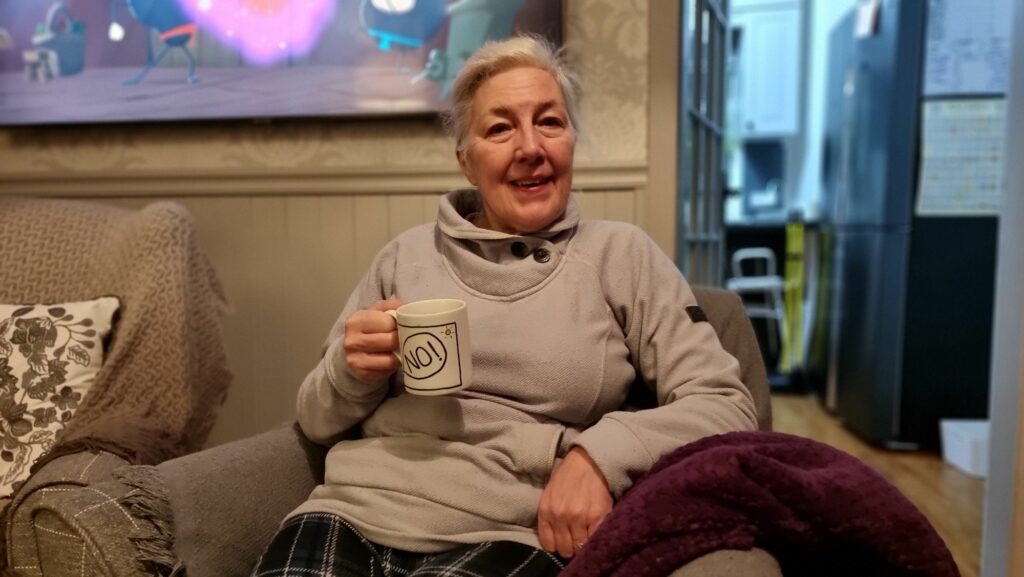
It turns out that apparently my recollection is correct: I really didn’t have any significant attachments to toys or anything like them. I didn’t ever have any kind of “special thing” I slept with. I recall in my later childhood being surprised to learn that some people did have such things: like all children, I’d internalised my experience of the world as being representative of the general state of things!
Why, I wonder, are some children different than others and get this kind of youthful attachment to something? Is it genetic?1 Is it memetic, perhaps a behaviour we subconsciously reinforce in our children because we think it’s “normal”?
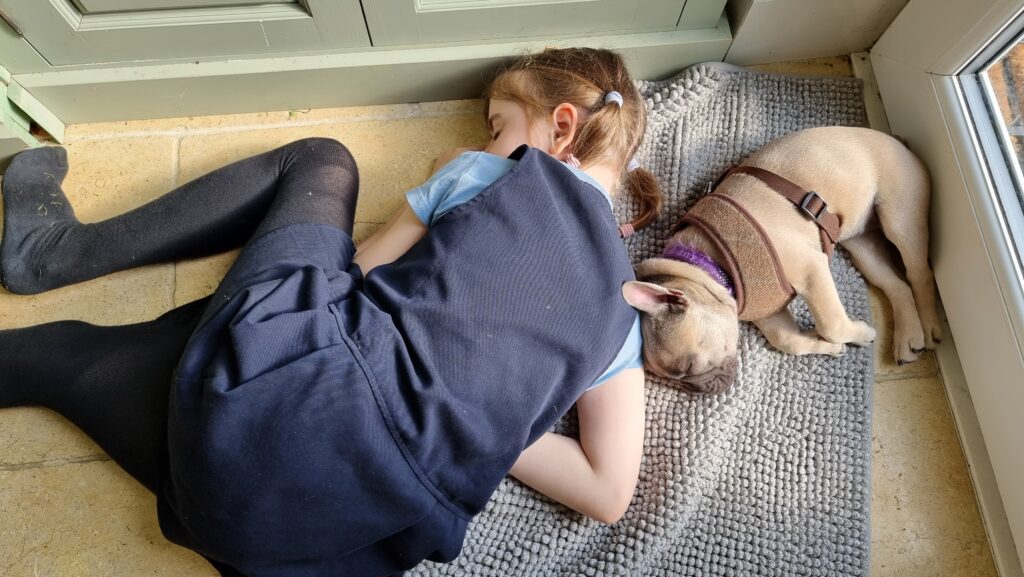
I’ll bet that some clever psychologist has done some research into this already2, but that sounds like a different day’s exploration.
Footnotes
1 I’m not genetically-related to our kids: they’re biologically the children of my partner and her husband, but consider all three of us to be their parents.
2 And that a dozen other psychologists have reinterpreted this research in completely different and incompatible ways.
[Bloganuary] Playtime
This post is part of my attempt at Bloganuary 2024. Today’s prompt is:
Do you play in your daily life? What says “playtime” to you?
How do I play? Let me count the ways!
RPGs
I’m involved in no fewer than three different RPG campaigns (DMing the one for The Levellers) right now, plus periodic one-shots. I love a good roleplaying game, especially one that puts character-building and storytelling above rules-lawyering and munchkinery, specifically because that kind of collaborative, imaginative experience feels more like the kind of thing we call “play” when done it’s done by children!
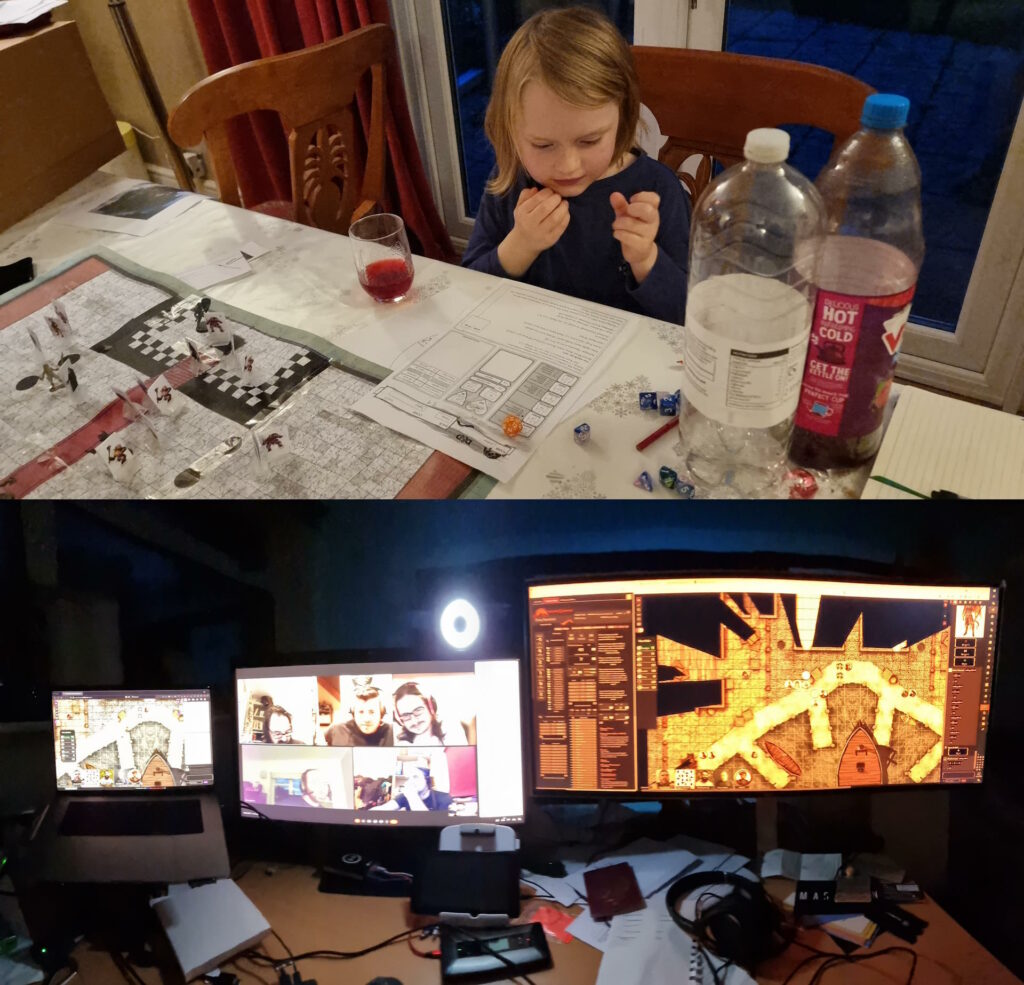
Videogames
I don’t feel like I get remotely as much videogaming time as I used to, and in theory I’ve become more-selective about exactly what I spend my time on1.
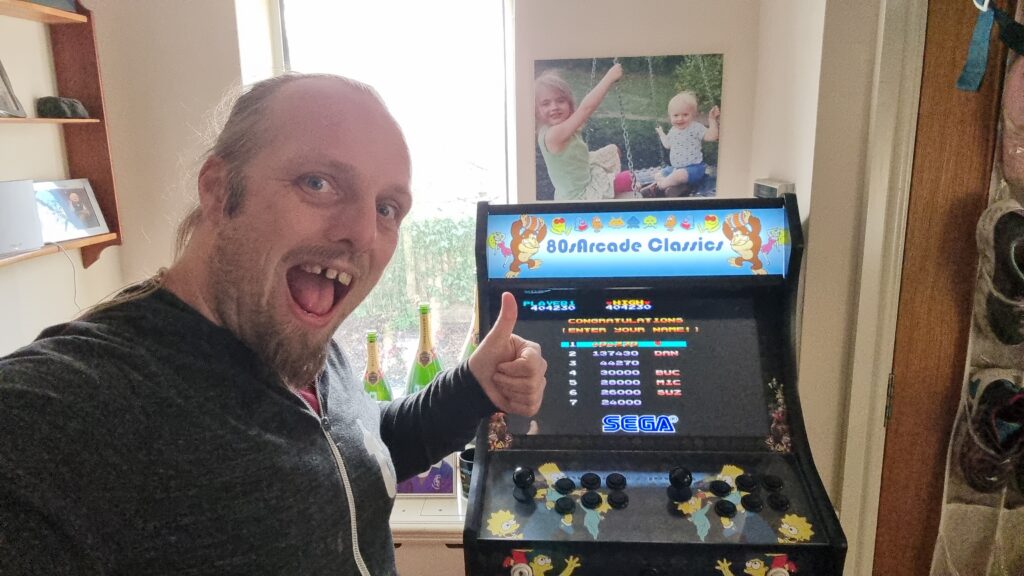
Board Games
Similarly, I don’t feel like I get as much time to grind through my oversized board games collection as I used to2, but that’s improving as the kids get older and can be roped-into a wider diversity of games3.
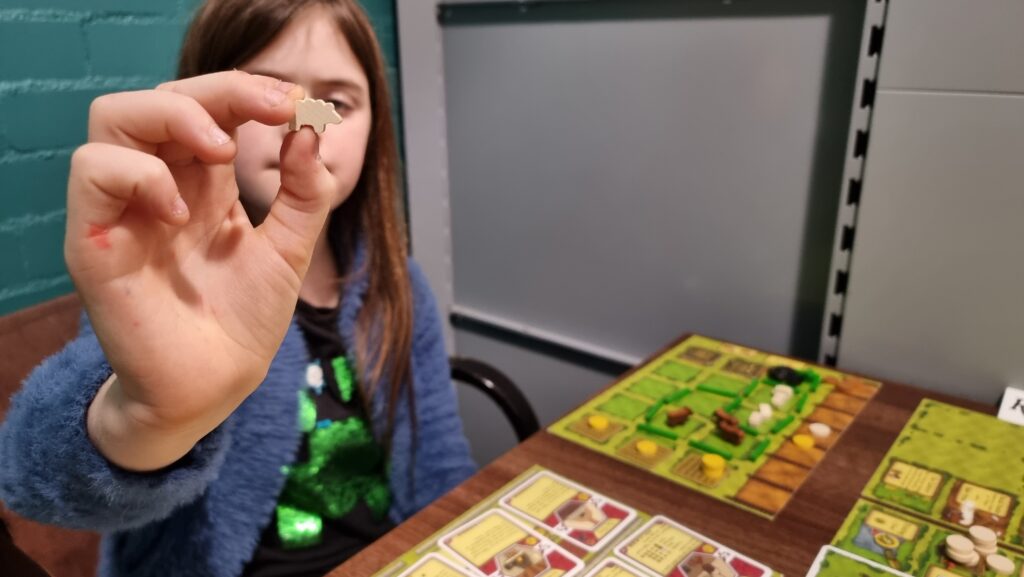
Escape Rooms
I love a good escape room, and I can’t wait until the kids are old enough for (more of) them too so I’ve an excuse to do more of them. When we’re not playing conventional escape rooms, Ruth and I can sometimes be found playing board game-style boxed “kit” ones (which have very variable quality, in my experience) and we’ve recently tried a little Escape Academy.
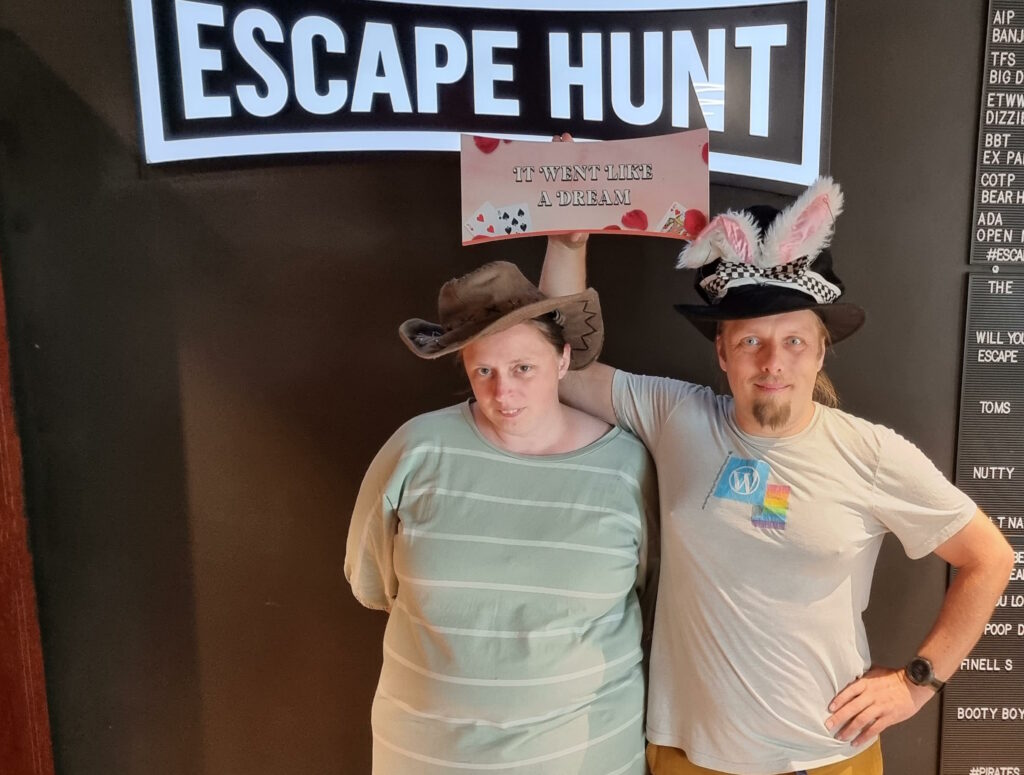
GNSS Activities
I’m sure everybody knows I do a modest amount of geocaching and geohashing.4
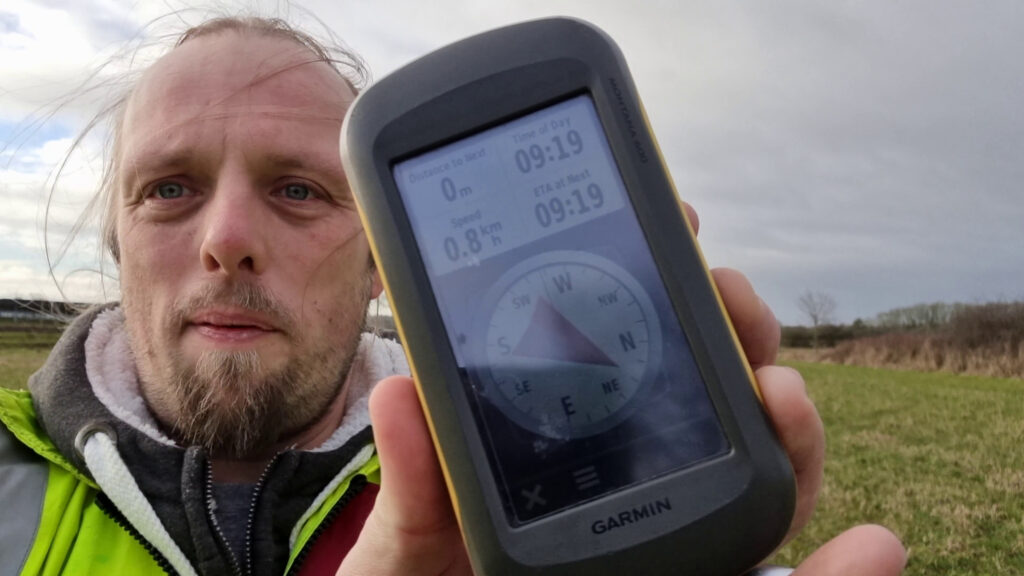
They’re not the only satnav-based activities I do at least partially “for fun” though! I contribute to OpenStreetMap, often through the “gamified” experience of the StreetComplete app, and I’m very slowly creeping up the leader board at OpenBenches. Are these “play”? Sure, maybe.
And all of the above is merely the structured kinds of play I engage in. Playing “let’s pretend”-style games with the kids (even when they make it really, really weird) adds a whole extra aspect. Also there’s the increasingly-rare murder mystery parties we sometimes hold: does that count as roleplaying, or some other kind of play?
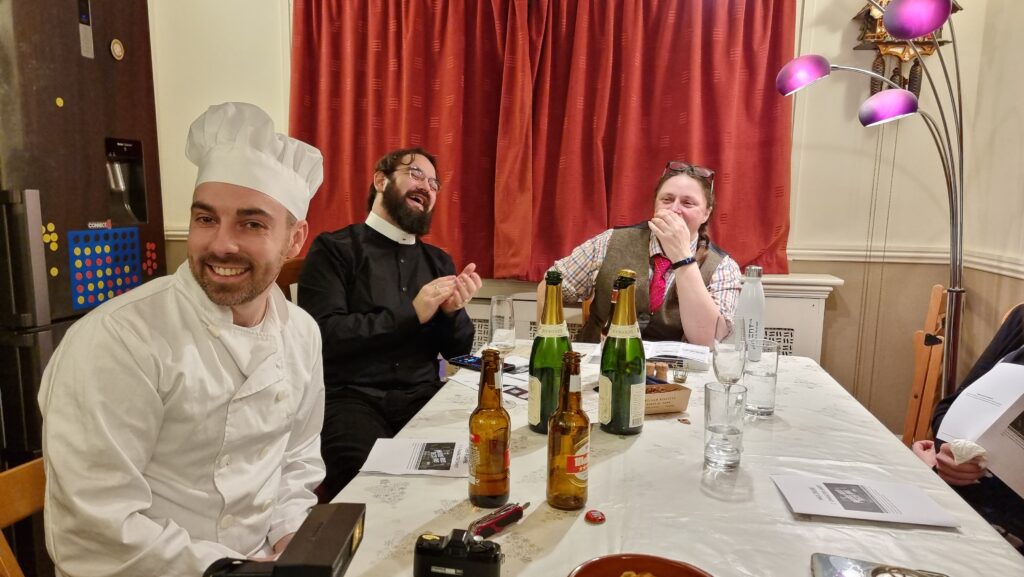
Suffice to say, there’s plenty of play in my life, it’s quite varied and diverse, and there is, if anything, not enough of it!
Footnotes
1 I say that, and yet somehow Steam tells me that one of my most-played games this year was Starfield, which was… meh? Apparently compelling enough that I’ve “ascended” twice, but in hindsight I wish I hadn’t bothered.
2 Someday my group and I will finish Pandemic Legacy: Season 2 so we can get started on Season 0 which has sat unplayed on my shelves since I got it… oooh… two or three years ago‽
3 This Christmas, I got each of them their first “legacy” game: Zombie Kids for the younger one, My City for the elder. They both seem pretty good.
4 Geocaching is where you use military satellite networks to find lost tupperware. Geohashing uses the same technology but what you find is a whole lot of nothing. I don’t think I can explain why I find the latter more-compelling.
Local Expert
At school, our 9-year-old is currently studying the hsitory of human civilization from the late stone age through to the bronze age. The other week, the class was split into three groups, each of which was tasked with researching a different piece of megalithic architecture:
- One group researched Stonehenge, because it’s a pretty obvious iconic choice
- Another group researched the nearby Rollright Stones, which we’ve made a family tradition of visiting on New Year’s Day and have dragged other people along to sometimes
- The final group took the least-famous monument, our very own local village henge The Devil’s Quoits

And so it was that one of our eldest’s classmates was searching on the Web for information about The Devil’s Quoits when they found… my vlog on the subject! One of them recognised me and said, “Hey, isn’t that your Uncle Dan?”1
On the school run later in the day, the teacher grabbed me and asked if I’d be willing to join their school trip to the henge, seeing as I was a “local expert”. Naturally, I said yes, went along, and told a bunch of kids what I knew!
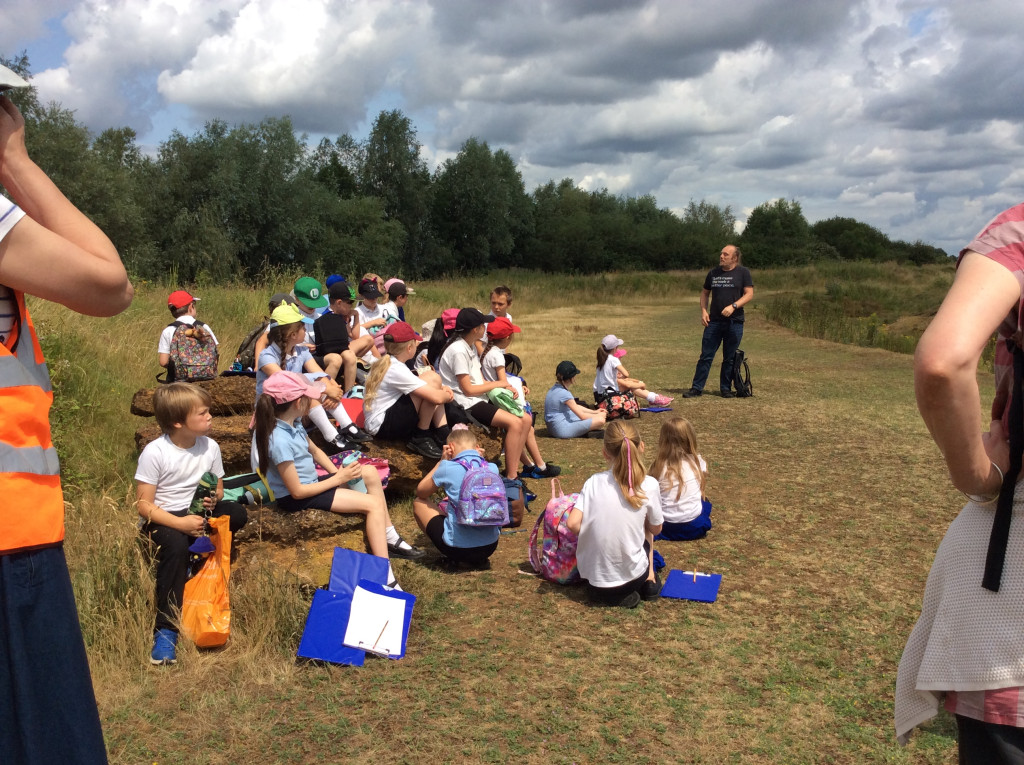
I was slightly intimidated because the class teacher, Miss Hutchins, is really good! Coupled with the fact that I don’t feel like a “local expert”2, this became a kick-off topic for my most-recent coaching session (I’ve mentioned how awesome my coach is before).
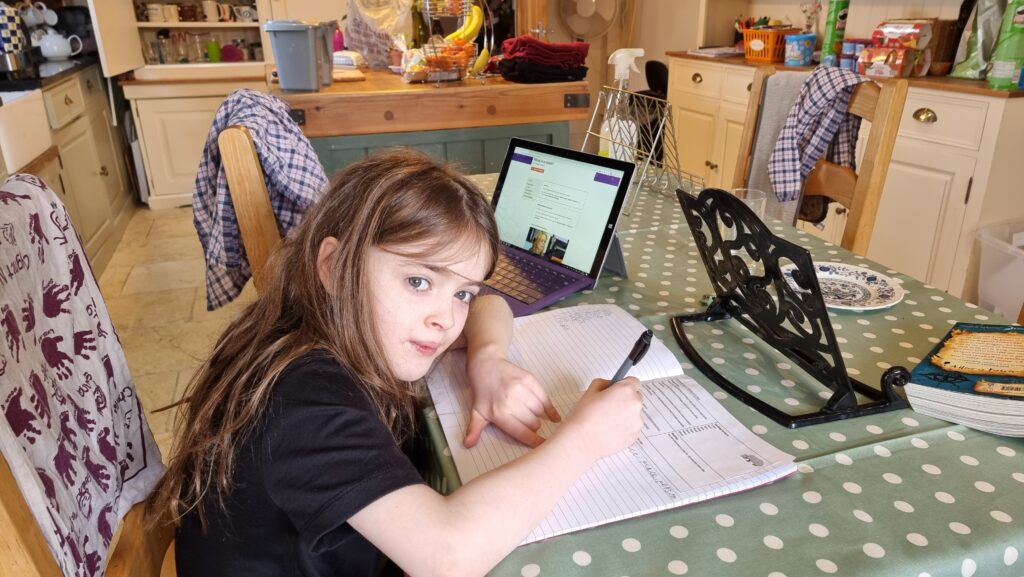
I eventually talked to the class mostly about the human geography aspects of the site’s story. The area around the Devil’s Quoits has changed so much over the millenia, and it’s a fascinating storied history in which it’s been:
- A prehistoric henge and a circle of 28 to 36 stones (plus at least one wooden building, at some point).
- Medieval farms, from which most of the stones were taken (or broken up) and repurposed.
- A brief (and, it turns out, incomplete) archeological survey on the remains of the henge and the handful of stones still-present.
- A second world war airfield (a history I’ve also commemorated with a geocache).
- Quarrying operations leaving a series of hollowed-out gravel pits.
- More-thorough archeological excavation, backed by an understanding of the cropmarks visible from aircraft that indicate that many prehistoric people lived around this area.
- Landfill use, filling in the former gravel pits (except for one, which is now a large lake).
- Reconstruction of the site to a henge and stone circle again.3

It turns out that to be a good enough to pass as a “local expert”, you merely have to know enough. Enough to be able to uplift and inspire others, and the humility to know when to say “I don’t know”.4
That’s a lesson I should take to heart. I (too) often step back from the opportunity to help others learn something new because I don’t feel like I’m that experienced at whatever the subject is myself. But even if you’re still learning something, you can share what you’ve learned so far and help those behind you to follow the same path. I’m forever learning new things, and I should try to be more-open to sharing “as I learn”. And to admit where I’ve still got a long way to go.
Footnotes
1 Of course, I only made the vlog because I was doing a videography course at the time and needed subject matter, and I’d recently been reading a lot about the Quoits because I was planning on “hiding” a virtual geocache at the site, and then I got carried away. Self-nerdsniped again!
2 What is a local expert? I don’t know, but what I feel like is just a guy who read a couple of books because he got distracted while hiding a geocache!
3 I’ve no idea what future archeologists will make of this place when they finda reconstructed stone circle and then, when they dig nearby, an enormous quantity of non-biodegradable waste. What was this strange stone circle for, they’ll ask themselves? Was it a shrine to their potato-based gods, to whom they left crisp packets as a sacrifice?
4 When we’re talking about people from the neolithic, saying “I don’t know” is pretty easy, because what we don’t know is quite a lot, it turns out!
Some Days the School Run is Easy
A video, in which I rant about the challenges of carrying two-childrensworth of school gear while dragging our dog, herding somebody else’s dog, and trying to stop the kids from fighting. Some mornings it’s easy. Today… it was not. Also available on YouTube.
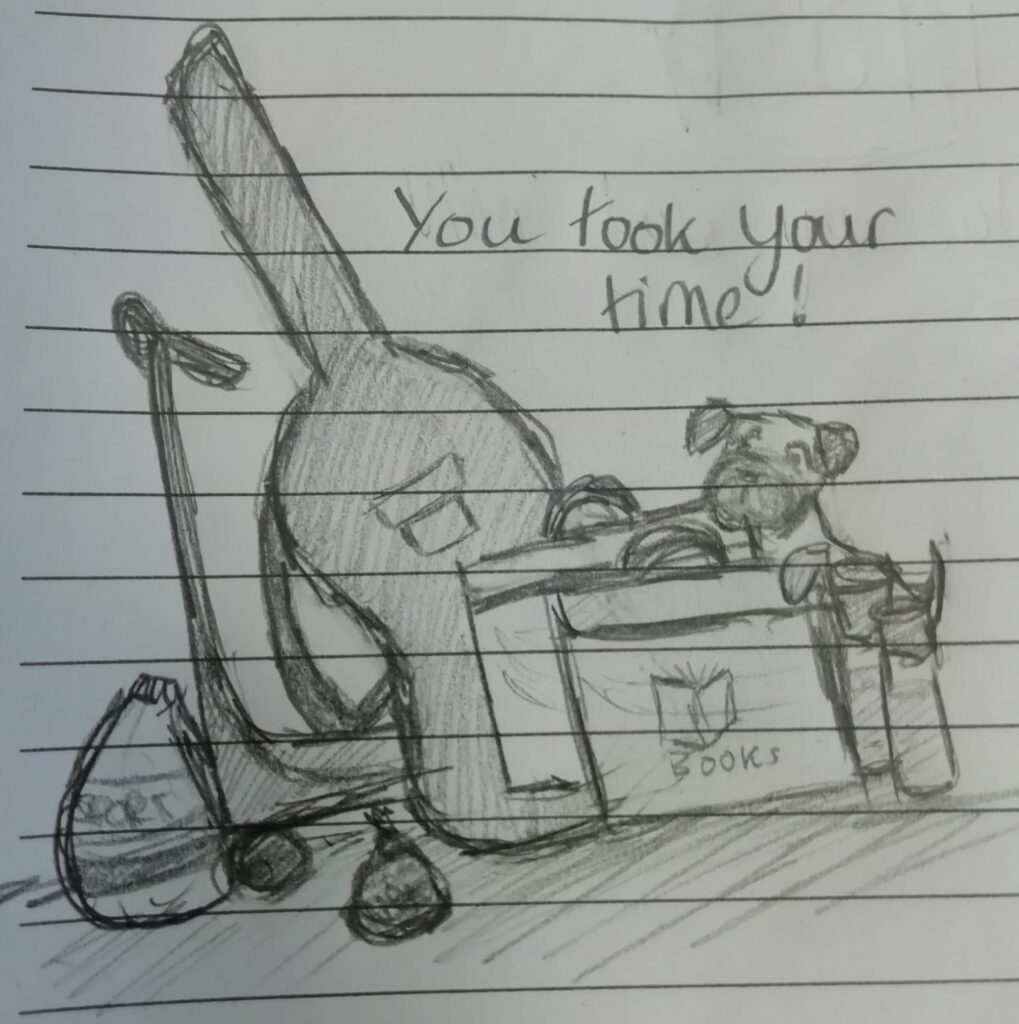
Full transcript of the audio (except for the ocassional snorting sounds of our noisy Frenchie as she snuffles about in the background):
The morning school run is never effortless. But some days it’s easy.
Today was not one of those days.
It’s a Wednesday. So, for some strange reason, that’s the heaviest-laden day. And so, with the eldest child on her bike and the youngest on his scooter I set off, pulling the dog, and carrying a PE kit, two book bags, two water bottles, and a guitar.
I should have realised early on that today wasn’t going to be a day that the universe smiled on me when the dog immediately ran off into a ditch to take a dump and I had to clamber down into the ditch with a poop bag to fill it.
But while I’m coming out of the ditch I discover that the youngest child has zipped off up ahead in an effort to ram into his older sister and in doing so has inevitably flipped himself over the handlebars of his scooter and is now lying, crying, in the middle of the road.
So I go over to him dragging the dog and carrying a PE kit and two book bags and two water bottles and a guitar and a bag full of poop and as best I can, carrying all those things, console him and eventually, with some encouragement he’s able to get back up and carry on walking to school, but says he can no longer scoot, so I have to carry the scooter.
Now I’m dragging a dog and carrying a poop bag and a PE kit and two water bottles and two book bags and guitar… and a scooter… and that’s when the oldest child manages to throw the chain off her bike.
Now she’s had little experience, in her defence, of the chain coming off her bike. And so she does the absolute worst thing possible which is tries to pedal as hard as possible to solve the problem which makes it much worse. By the time I get there the chain is royally snarled between some of the sprockets and their housing, so I put down the guitar and the bag of poop and I hand the lead to the younger child so that I can try to unpick the older child’s chain from her bike, getting myself covered in oil.
And that’s when I notice the commotion up ahead. There are some workmen who are rebuilding the wall outside Letterbox Cottage, and – up ahead of them – barking furiously, is a small dog. This dog is Lovey, and she belongs to a friend of ours. And she’s probably the best example of whatever the opposite of nominative determinism is. Because Lovey is a truculent little bitch. Lovey is a tiny small yappy dog who will start a fight with other dogs, try to see off workmen (which is what she’s doing at the time), and she’ll bark at passing cars. And right now she’s running free, unattended, in the middle of the road. And one of the workmen says to me, “Oh, do you know who’s dog that is?” and I have to admit that yes, I do.
So, dragging our dog and carrying a PE kit and two book bags and two water bottles, a guitar, a scooter, and a bag of poop, I have to help round up this lost dog, who – if it gets too close to our dog will start a fight – and get it back to the house where it lives.
So the younger child and I manage to succeed in our mission and return this lost dog and get back on our way to school and it’s there that we finally catch up with the older child who’s gotten bored and cycled ahead. And when we catch up to the older child with me dragging the dog and carrying a PE kit and two book bags and two water bottles and a guitar and a scooter and a bag of poop… she looks up at me and says, “Ugh! You took your time!”
Suffice to say, it’s a good job I Iove those children.
